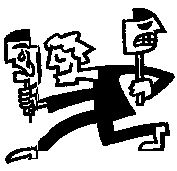For creative teamwork due consideration must be given to each individual's role, temperament and outlook. None of the Knights of the Round Table was the same, still they cooperated and managed to make the country a better place. When cooperating with others individual differences should be considered and used. Different stages in the process need different approaches, for each of us there is a place.
Some types:
- The creator; the generator of new ideas and a great stimulator of the group. Together with
- the dreamer the pacemaker of the inventive search process.
- The questioner; usually the one asking critical questions to the others, 'yes, but ...'. Very useful in the verification stage, a hindrance in inventive search.
- The analyst; is the one who orders, labels and a great stickler for method. Tends to be averse to the chaotic process, but once the method through the chaos is appreciated can be of great help, especially in the problem-definition phase.
- The researcher; the ideal person for checking and computing suggested solutions.
- The decision maker; tends to want to control the process to quickly come to a decision, without caring so much what type of solution.
- The doer; no deep thinking or probing for him, he just wants to do something. Can be dangerous in a inventive search session. Helpful in finding facts for analysis.
- The realist; hardly ever chooses for the new, feels 'with two feet on the ground' and often will not hesitate to let others know they are 'far out'. Chooses for the feasible rather than the new and adventurous. Helpful in the final stages and in finding the problems, sees problems very easily.
- The clown; sees the sessions as a wonderful opportunity to have personal performance. May be a pain in the neck for some of the others. Tends to be self-centered rather than problem-centered.
- The cynic; ideal as sounding board for checking new ideas. If anything isn't ok, he'll not fail to notice it.
- The cowboy; will never fail to remind others of similar things in the past and ..... how things went wrong then.
- The idea killer; much more dangerous than the cynic, as he will tend to spoil the atmosphere in the group. Not very useful unless as test case for new ideas.
- The oracle; knows how things were done in the past and might be useful to prevent the same mistakes as were made in the past.
- The traveller; like Gulliver does not regard himself very creative but once started can be of great help.
- The satirist; can be of great help to ridicule existing views i.e. blocks, see also fools, jesters and other senses.
- The extravert; a great help in the implementation phase. Is usually very interested in what others think and may contribute to 'selling the idea'.
- The introvert; very helpful in the idea generation phase. Uses the outside as catalyst to find new ideas. Usually of little help in creating acceptance of new ideas.
Others types are given in the enneagram, all very worthwhile.
Being conscious about one's characteristics will be of great use for a creative thinking process. One may even use people in opposite roles, cynics tend to be great fantasists once they accept the role. They are often cynics because they are too aware of the other side.

Using the roles can be very effective in staging a role play. This is an effective and too little used creative thinking tool. By consciously playing another role and evaluating, for instance on video, what has happened later, new angles will be found. The strength of the role play is that communication is no longer abstract, the played scenes can and should be realistic. Role play promotes learning in a relaxed manner by means of playing. In all of us the motivation to learn is strongly linked to the desire to communicate with others and together create something. Learning by way of role plays with evaluation and feedback sessions strengthens confidence both in oneself and others. It makes mistakes acceptable ('one only plays a part') and creates the possibility to use the mistakes to learn from. Performing in a play shows the interdependence. The source of creativity lies in the diversity of opportunities and the conscious joining of forces.